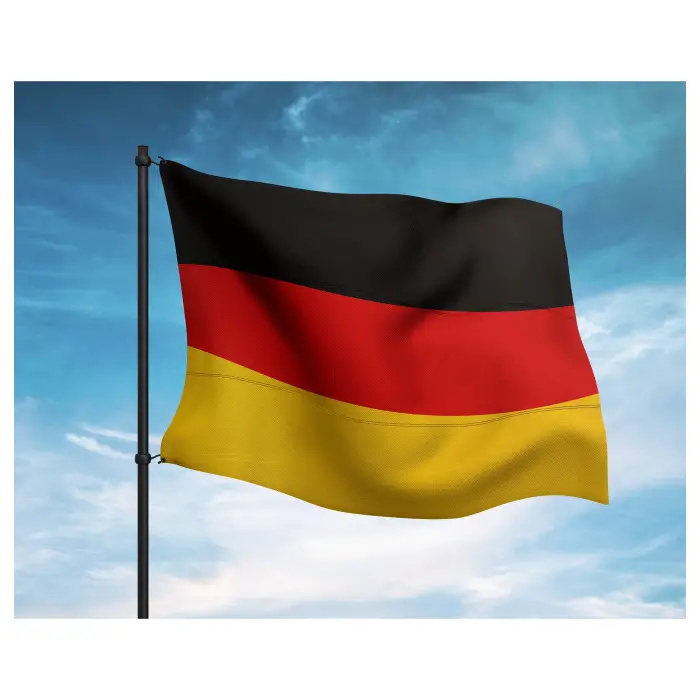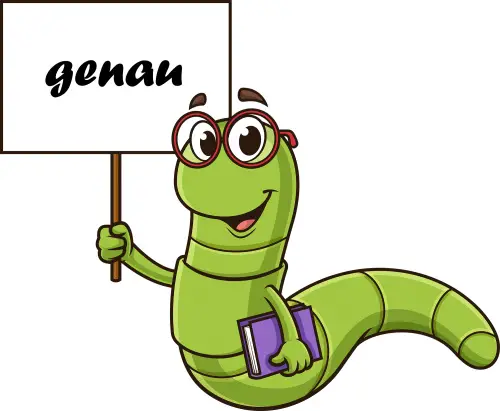Although German and English share a common origin, and therefore also an extensive vocabulary, some sounds, etc.; the differences are still very apparent. These discrepancies include words that neither sound nor look like any of the English vocabulary you may be familiar with.
The German genau is used as an adjective (exact), adverb (exactly), or on its own (I agree or for sure). It commonly affirms or adds emphasis. To pronounce it correctly, the first half is used as in English (gah) and the last two letters (au) follow uniquely German pronunciation (gah-now).

And with Americans claiming German ancestry more than any other affiliation (US Census), it’s not surprising that you have decided, nonetheless, to pursue fluency in this foreign language!
If that’s the case, you likely have already encountered, or are sure to soon, the prevalent word “genau.” We’re going to tackle this popular word’s meaning, usage, proper responses, and how to pronounce it.
So, let’s get started!
Contents
Why do Germans say ‘genau’ all the time?
As soon as you step foot in a German city your ears are likely to be bombarded with the Germans’ unofficial favorite word: Genau. Probably why it’s in the title of this popular German language book, Ja genau! (available on Amazon).
It seems that Germans say ‘genau’ all the time because it is one of their most frequently used words, due to it being succinct, simplistic, and fitting for many conversational contexts all across Germany. In this way, genau happens to be a perfect word that mimics the typical German personality.
A quick aside: by “German city” I mean every other city in Germany besides Berlin. I have swiftly been informed by many of the inhabitants around Berlin that this famous city is decisively separate from the rest of the country, for reasons which will take an entirely new article to sufficiently analyze. Are they joking? Hard to say, we all know that Germans have no sense of humor, after all.
Regardless, now that you have been made aware of the Germans’ obsession with the word “genau,” you will surely notice the phenomenon the next time you listen to Germans ‘in the wild’.
The German “genau” is much like the American English “like,” “so,” or other commonly said word; not in meaning, but rather in abundance, frequency, and a general inability to escape hearing it spoken in every other conversation.
Although culture can obviously vary by region and person, German mannerisms are frequently described as largely reserved, honest, and direct. This is reflected in their use of language.
Specifically, the word “genau,” is an obviously short and concise word, as is its meaning. For this reason, it makes sense that its use is so frequent across the countries where German is spoken.
The Germans like to make themselves understood in as few syllables as possible, and with minimal chance for misunderstanding. These criteria can be achieved with the use of the word “genau.”
Similar articles from Double Speak Dojo on German language:
- Is German Phonetic? (Answered)
- Is French Similar To German? (Revealed)
- Is German Fun To Learn? (Self Learner Reveals)
What is the meaning of genau?

Genau generally means exactly, I agree, or for sure. Like many commonly used words in English, genau can be used in varying parts of speech such as an adjective, adverb, or just on its own. It is one of the most frequently used words in the German language, and even used as slang or for sarcasm.
“Genau”, when used alone, means “exactly,” “I agree,” or “for sure.”
| German Conversation | English Translation |
| Die Aufgabe ist viel zu schwierig! Ja, genau! | The assignment is way too difficult! Yes, I agree! |
The word can, however, oftentimes be used to mean the adjective “exact” as well.
| Wir müssen die genauen Abmessungen des Zimmers untersuchen. | We need to determine the exact dimensions of the room. |
When used within a sentence it is often meant as a qualifier, like an adverb.
| Ich kann mich nicht genau daran erinnern. | I cannot remember exactly. |
But of course, tone can change everything! Just like with any other word, if spoken with sarcastic intent, “genau” can take on an entirely new meaning. When the word is used as intended, there is the connotation of strong affirmation/agreement.
Therefore, if the meaning is subverted with a sense of disbelief or sarcasm, the word can also have a strong impact in the opposite direction!
| Außerirdischen existieren. Meine Kusine wurde letztes Jahr entführt! Genau… und ich habe Superkräfte. | Aliens are real. My cousin was abducted last year! Right… and I have superpowers. |
How do you respond to genau?

Genau used alone does not necessarily elicit a response. Short, direct, and to the point, the word can oftentimes be the conclusion to a conversation. But don’t perceive this as a negative; as previously discussed, “genau” is a word conveying agreement and affirmation. Context is critical.
The person you are talking to wholeheartedly shares your point of view!
Similarly, since it is also sometimes used as a filler word, (i.e. the word is absentmindedly repeated while their companion speaks or during their own monologue) again, no response is required.
Indeed, it’s not uncommon to hear two people say “genau” back to each other, both times serving as their own response.
So when someone says “genau” to you, feel reassured that this conversation partner agrees with you, or that you are having a productive dialogue. Know that there is no necessity to respond, but if you wish to, you can either choose to continue elaborating on your previous point, or you can choose the ‘German route’ by being direct and succinct, and respond with another resounding, “Genau!”
Proper Pronunciation Of Genau
Pronunciation of a foreign word can be a daunting task. One wants to do the language justice, avoid making a fool of themselves, and does not want to offend foreign speakers, but simultaneously wants to practice what they’ve learned without fear of judgment.
The German word genau has two syllables. The first (gen) is said like /gah/ in English and the last syllable (au), stressed, is pronounced like ‘ow’ as in the English words now and how. It’s one of the easiest German words to say, and since it’s used a lot, you’ll get many opportunities to use it.
A lot of people who are making that daring attempt at speaking German are overcome with pressure. They have to remember multiple grammatical rules (did I say multiple? I meant to say ‘dozens’!), how to adopt a german ‘accent’ (or as close as you can manage to one), what letter combinations make which sounds, and how to get rid of one’s own harsh accent.
By the time you’re ready to say your sentence, you’re so stressed out that you’ve forgotten what you were trying to say in the first place!
Well put all your fears to rest; I’m here to help you out with about 0.001% of that stressful foray into learning German. Namely, we’ve got you covered with the pronunciation of the German’s favorite word: Genau.
Once you’ve mastered this word, you’re pretty much halfway done with your study of German (I wish; I just wanted to give you a bit of hope after my not-so-motivating book recommendation at the beginning of this article).
German Dialects
A quick forewarning before we jump into breaking down the word pronunciation; if your German language journey is relatively new, you may not be aware of just how many dialects exist in German.
Because the most dramatic variations in English typically take place across multiple continents, some native-English speakers are surprised by just how many dialects exist in the German language over such a (relatively) small country (let alone the dialects found in Austria, Switzerland, Luxembourg, Belgium and Lichtenstein); I know I was shocked.
Especially since these dialects can often be so “strong” that two Germans from opposite ends of the country (a country barely bigger than the state of New Mexico, mind you) speaking their native dialects will barely understand a word the other is saying.
All of this is to say that there exists a “standard” German called “Hochdeutsch” or “High German.” Dialects may result in different accents, and therefore different pronunciations, slang, etc.
How To Pronounce Genau In Hochdeutsch
Here we will solely focus on the Hochdeutsch pronunciation of “genau” (i.e. don’t be surprised if pronunciation can vary slightly between Germans based on their accent and the influence of their dialect).
You may first breathe easy knowing that the first three letters of the word ‘genau’ have the same pronunciation as in English. Namely “g,” “e,” and “n” by themselves are all phonetically pronounced as you learned in your elementary school or kindergarten (German word of the Day! Kinder = children, garten = garden).
The next step to know is the sound that the combination of “a” and “u” in German makes. Technically, in English we have this letter combination and it makes its own distinct sound (think of “audio,” “pause,” or “faucet”).
This will only serve to confuse you here, so forget your preconceptions based in English for this part! In German, this combination makes a sound equivalent to the English “Ow!” (think of “now” and “cow”).
Now that you know how everything should be pronounced, let’s quickly take a look at how to group these sounds together. The word has exactly two syllables, grouped as shown: ge-nau.
A writing which might help you tackle this word quickly is “geh-now.” And finally, if you are a geek used to reading out sounds according to the IPA (International Phonetic Alphabet), here you go: [ɡəˈnaʊ̯].
You are now ready to fool Germans into thinking you are a native; viel Glück!
The Final Word On The German Genau…
So there you have it! Genau is a fun and simple German word to learn that means exact; exactly; and I agree. It’s typically used for emphasis or in agreement. And you’ll get many chances to practice it, since it’s used very frequently, all over Germany. Get it? Genau!
For more articles like this one on German, I recommend these next:
